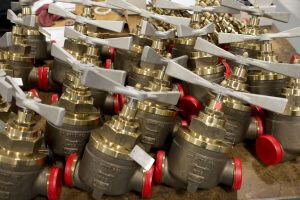Challenges of Worksite Safety
The Importance of Technician Education in Safe Valve Operation
 Safety is a top priority in the industrial workplace. One of the biggest challenges to worksite safety is an untrained or undertrained workforce.
Safety is a top priority in the industrial workplace. One of the biggest challenges to worksite safety is an untrained or undertrained workforce.
Education is fundamental to the safe operation of the valves in any facility. Knowing how to properly operate, maintain, and troubleshoot them helps ensure the safety of the technicians and other personnel.
Add the mechanical workings of the equipment to the advanced technology that’s now common in valve actuators and you’ve got even more than your valve technicians need to learn or keep up with.
Proper routine maintenance will, under normal circumstances, extend the life of a valve. Maintenance reduces the likelihood of problems. And it reduces the risk of valve failure or breakdown. Depending on the nature of the business and function of the valve, the cost of valve failure can be extraordinary and can have potentially devastating effects.
Smooth Operator
The best way to keep your valves operating smoothly and efficiently is by performing routine maintenance on a predetermined schedule. Valves should always be kept clean and lubricated as suggested by the manufacturer. Information about maintaining your CPV valves can be found here http://www.cpvmfg.com/technical-resources/valve-maintenance-tools/.
Despite following a prescribed maintenance plan, unexpected problems may still arise from time to time. Before the development of smart actuators, such problems were diagnosed by taking the equipment apart until the technician found what was causing the trouble. Modern smart equipment doesn’t always work that way.
Smart actuators gather information that can be used to diagnose or troubleshoot potential valve problems. Disassembly, other than as prescribed for inspection or maintenance, where smart actuators are involved can lead to more problems rather than solutions. The well-trained technician knows how to use the right diagnostic tools with the right equipment to provide a more accurate diagnosis without going through unnecessary, potentially harmful steps.
“Aged” Equipment
The breakdown or malfunction of older valves presents a bit more of a challenge. Some older equipment may not have a user’s manual or any written information to guide your valve technicians.
There are valves in some facilities that have been in operation for more than five or six decades. Over the years the technicians who worked with them have, with or without written manuals, learned all the ins and outs…all the tricks.
For management of these valves, the best training comes from mentorship by the people who know how they work…the same people who, having become experts after many years of working with them, are now exiting the workforce.
To reduce this experience gap if they’re not already doing so, employers should consider hiring replacements several months in advance of the departure of senior technicians. Doing so would allow time for mentorship and training that you just can’t get anywhere else.
Valves play critical roles in industrial facilities and worksites across the globe. Educated valve technicians play critical roles in keeping them in top working condition.
At CPV we take pride in our commitment to our customers. Contact http://www.cpvmfg.com/contact-us/ our customer service team to learn more.

